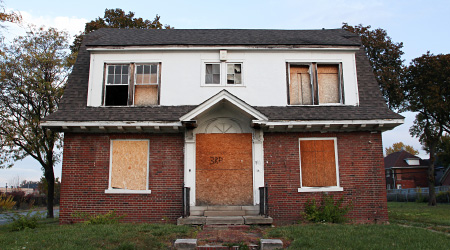What Does Foreclosure Mean?

During the current economic crisis many individuals and families lost their sources of income and were unable to pay their monthly mortgages on time. In many situations residential homes fell into default due to the lack of payment which began the foreclosure process. That is essentially what a foreclosure means. When a loan obligation on a property ceases to be paid according to the loan agreement the title holder, often a bank or mortgage holding company, can begin foreclosure proceedings. A foreclosure is a legal process which goes through the courts. How it gets to this point is a little more involved.
Almost anyone who has owned a car at some point in their life has probably had to at one time or another taken out an auto loan to afford their vehicle. Given the number of people who have cars either they themselves or someone they know has probably had a vehicle repossessed. And why did the vehicle get repossessed? Because the person who owns the car stopped making payments and the financial institution which owns the title took the car back for failure to repay the loan. Foreclosures on property work in a very similar fashion but due to some slight differences there are extra protections in place and legal requirements which need to be fulfilled in order to begin and finalize the foreclosure process.
When purchasing a home, either new or used, there are significant amounts of paperwork involved to facilitate a closing. Everyone's familiar with earnest money, home inspections, title checks and mortgage pre-qualification. Needless to say it's a very involved process with multiple parties participating crossing a lot of t's and dotting a lot of i's. This is due in part because of the way property rights work but also because of the relatively large sum of money involved, normally in the hundreds of thousands of dollars. Buying a home is an extremely serious financial obligation and every lender and every individual will tell you that regardless of anything else that happens in your life even if you have to stop buying food always pay your mortgage. If that no longer becomes financially possible and mortgage payments stop then the titleholder will begin foreclosure proceedings.
A foreclosure begins when the mortgage holder has not received mortgage payments for specified period of time and the account is considered in default. At that point the mortgage holder can petition the courts by filing various pieces of legal paperwork to foreclose on the property. The reason why this has to go to the courts is because the mortgage holder has to prove they legally own the title as well as certain specifications have to be fulfilled to evict the current residents from the property. Once the mortgage holder has the appropriate paperwork and eviction notice they normally enlist the help of local police or sheriff's deputies to inform the current residents and to give an eviction date. The eviction date established by the court provides enough time for the current occupants to gather their property and vacate the premises. This is an important step as it prevents title holders from driving up to a property and kicking families out on the street.
After the foreclosure has been processed and the current occupants evicted the property is then considered "bank owned" in both the legal and physical sense. At that point many financial institutions will conduct foreclosure auctions to sell the property, sometimes at a loss, to property investors. Due to the legal process involved the original homeowner, while no longer liable for the outstanding mortgage debt, will have the foreclosure appear on their credit history for up to 7 years. This will more than likely prevent the homeowner from being able to obtain a new mortgage as well as possibly negatively affecting future employment and the ability obtain other types of loans. A foreclosure is probably the second worst thing that can appear on a credit report right below a personal bankruptcy so is best to avoid a foreclosure at all costs.
Elsewhere on StockMonkeys.com







